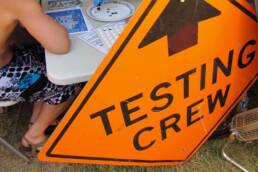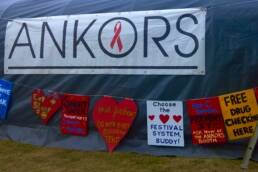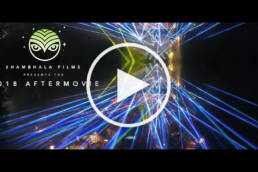Michelle Shewell is a drug-safety volunteer and long-time raver turned saver. Writer Jeff Pew has a frank chat with her about drugs, festivals and saving lives.
It’s 1:30 a.m. on a hot and smoky August night at the Shambhala Music Festival’s Pagoda Stage. Thousands of sweaty festers dance wildly to the electronic beats of Black Tiger Sex Machine. Minutes away, in the Health and Safety Services area, a continuous line of attendees have waited up to two hours to have their recreational drugs checked for adulterants, the substances added by dealers and illegal drug makers to increase a drug’s quantity, reduce manufacturing costs and alter its potency. According to the Coroners Service of British Columbia, from January to July 2017, over 700 overdose deaths in British Columbia involved the adulterant fentanyl. It is a well-publicized crisis, and at Shambhala, where festivalgoers take their raving seriously, people don’t mind waiting to ensure they’re not only partying safely but also staying alive.
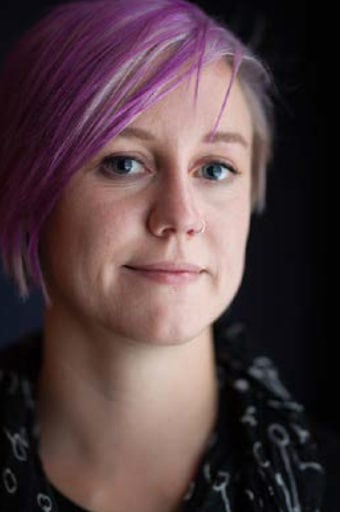
AIDS Network Kootenay Outreach and Support Society (ANKORS), the Kootenay-based non-profit society, has operated the drug-testing tent at Shambhala since 2003. Michelle Shewell, 28, has volunteered at the ANKORS tent for the last three years. She holds her Master of Social Work and has hula-hooped through raves and festivals since she was a teenager. In addition to drug checking, she updates a six-foot-high info screen displaying warnings about potentially dangerous drugs circulating at the festival.
“Yellow/black batman bag. Sold as Cocaine. Found Ephedrine. Ephedrine and cocaine can be dangerous when used together.”
“Slenderman pattern on baggie. Sold as Ketamine. Possible PMMA in baggie. PMMA can cause fatal hyperthermia at any dose. Check in with medical if feeling too hot or unwell.”
Of the over 2,000 drug checks during the four-day festival in 2017, 20–30 per cent are unknown, or not what the purchaser thought they were. When a test detects the possibility of a harmful adulterant, people are encouraged to use the safe disposal site.
“One guy thought he’d purchased cocaine,” Shewell says. “When he discovered it contained harmful adulterants, he disposed of thousands of dollars of coke. He was disappointed, but relieved he hadn’t used.”

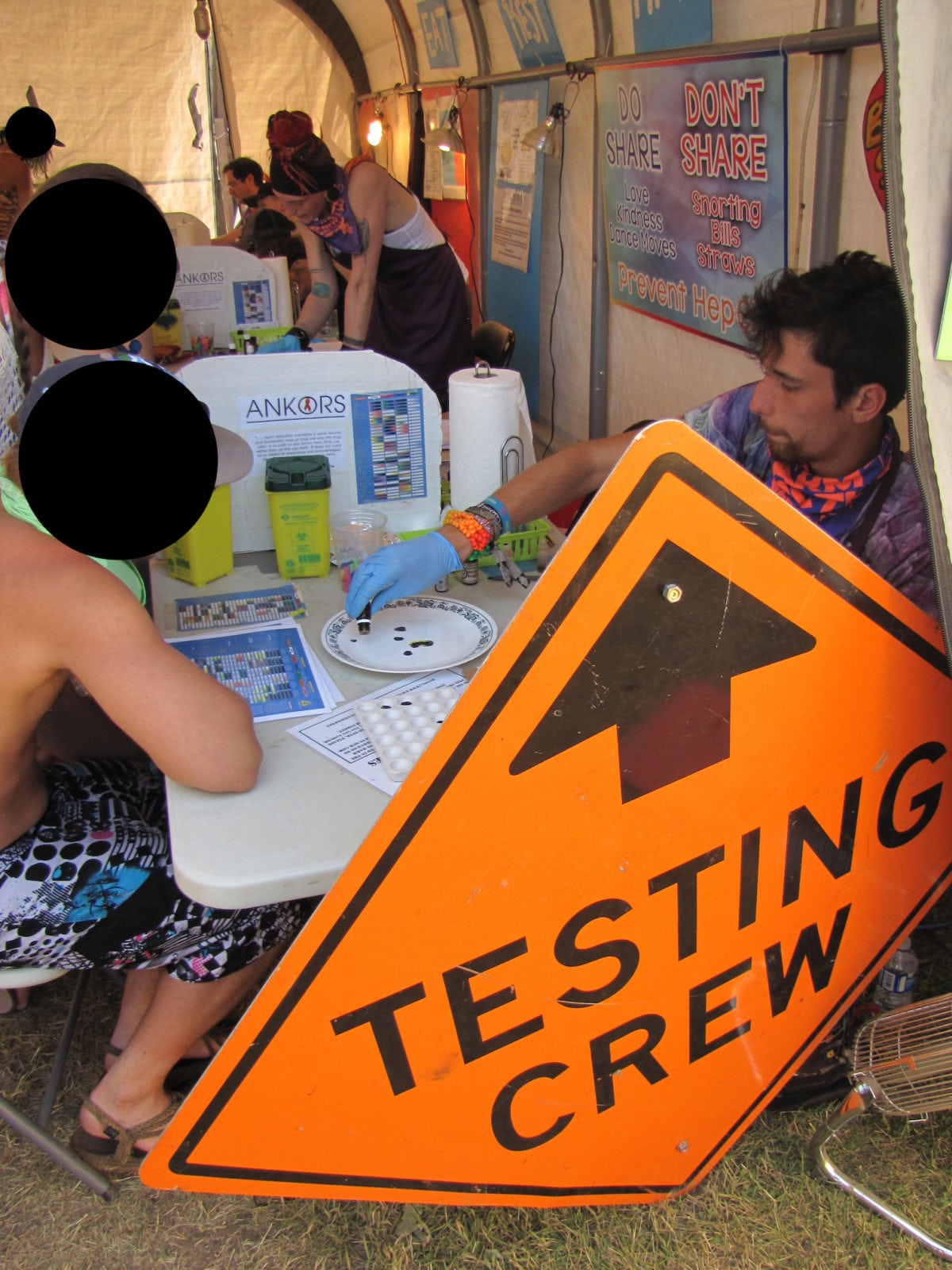
“I was going through an identity crisis,” says Shewell, recalling her first experience at Shambhala eight years ago. “It felt like I was living a double life. I’d been going to festivals and raves since I was a teenager, and yet I was doing my undergrad in social work. There’s a stigma about festival life, and I felt that by lying about raves I was perpetuating this. When I was finishing my degree, I was in line for Shambhala and someone gave me a pamphlet on harm reduction for partying safely. I went to the ANKORS tent and spoke with them. It was a turning point. I could put these two things together, social work and festing, in a really positive way.”
The ANKORS tent is just one component of Shambhala’s internationally recognized and applauded harm reduction efforts. In addition to drug testing, Shambhala’s Health and Safety Services provides medical facilities, a safe space for women, a sexual health division, a harm reduction outreach team, a sober camp for festivalgoers who want to remain drug and alcohol free, and the Sanctuary, where attendees can chill out if they need a safe, quiet place.
In twenty years, there’s only been one drug-related death at the festival. Britz Robins, Shambhala’s public relations manager, states, “We’re incredibly proud that we’ve been such vocal advocates of harm reduction at music festivals and beyond. Our non-judgemental approach is the most effective way to keep festivalgoers safe. Attendees can access services and information without fear. This empowers people to make safer, more informed decisions about how they party.”
According to Chloe Sage, who heads ANKORS drug testing: “New technology is required to increase the accuracy of our drug testing and identify new psychoactive substances. The Fourier-Transform Infrared Spectroscopy (FTIR), currently used by the City of Vancouver, in conjunction with fentanyl test strips, is our best choice. With a fundraising push, we could utilize this at Shambhala 2018 and make it accessible in the Kootenay region year-round.” [Ed Note: Fundraising efforts were successful. Read about it here: Shambhala Gets New Drug-Testing Device This Year.]
At 3 a.m. Shewell’s shift is coming to an end. Instead of raging all night, she’s ready for bed. “This summer’s been really tough,” she says. “Three friends passed away. I’ve lost nine people from the war on drugs, and I’m only 28. I don’t believe addiction kills people. It’s the shame and stigma society perpetuates. People overdose when they’re alone. At Shambhala drug use is talked about. No one is shamed. People are concerned about the safety of their drugs. They want to know if something’s going to harm them.”
Jeff Pew
Jeff Pew is co-founder of Poetry on the Rocks, an annual celebration of spoken word in the East Kootenays. He works as a creative writing teacher and counsellor to teens. He lives in Kimberley, BC.
Related Stories
Shambhala Gets New Drug-Testing Device This Year
A fundraising campaign by the non-profit ANKORS organization has reached its goal to purchase a drug-testing…
Shambhala 2018 Aftermovie
Sweetgrass Productions has just dropped the Shambhala 2018 Aftermovie and it's killer. Watch it here. Last year we…
Shambhala Music Festival to Launch Ticket Sales Sept. 1
Set to host their 20th Anniversary August 11-14, 2017, and coming off one of the most talked about and celebrated…
Shambhala 2017 Sells Out In 17 Hours
For the first time in the 19-year history of the Shambhala Music Festival, tickets have sold out in less than a day. On…
Shambhala Announces its 2022 Line-up
Shambhala, Canada’s longest-running electronic music festival, released its 2022 lineup today after a two-year hiatus.…


